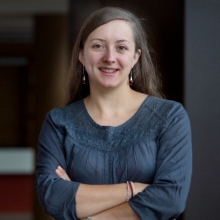CEE Seminar: Canopy Interception - the Influence of Leaf Wetness on Vegetation Water and Carbon Fluxes

Monday, November 19, 2018 - 1:00 p.m. to Tuesday, November 20, 2018 - 1:55 p.m.
McDonnell Douglas Engineering Auditorium
Cynthia Gerlein-Safdi, Ph.D.
Junior Fellow from the Michigan Society of Fellows
Department of Climate and Space Sciences and Engineering
University of Michigan
Abstract: Canopy interception of rain, dew and fog occurs in ecosystems worldwide. A ubiquitous effect of leaf wetness on plant water balance is the interference of the water droplets with the leaf energy balance, which increases leaf albedo and emissivity and decreases leaf temperature through droplet evaporation. This, in turn, affects the vegetation carbon uptake rate, with potential consequences for the whole global carbon cycle. Here, I use the specific example of dew deposition to understand how leaf wetness affects water and CO2 fluxes of plants. First, I present a simple leaf energy balance that characterizes the effect of deposition and the evaporation of dew on transpiration and carbon uptake. The model is driven by five common meteorological variables and shows very good agreement with leaf wetness sensor data from the Blue Oak Ranch Reserve in California. I explore the tradeoffs between energy, water and carbon balances for leaves of different sizes across a range of environmental conditions. I then present results from a laboratory experiment where Colocasia esculenta leaves were misted with isotopically enriched water to mimic canopy interception. Leaf water isotopes and water potential measurements suggest a ∼ 30 percent decrease in transpiration rate compared to control leaves, which corroborates the results of the model.
Bio: Cynthia Gerlein-Safdi is a junior fellow of the Michigan Society of Fellows, working in the department of Climate and Space Sciences and Engineering at the University of Michigan in Ann Arbor. She is an ecohydrologist, and her research focuses on the impact of rain, dew and fog interception on canopy water dynamics. She is involved in the CYGNSS mission, using the brand new data to resolve the daily cycle of canopy water. Prior to arriving at the University of Michigan, Cynthia received a doctorate from the Eepartment of Civil and Environmental Engineering at Princeton University, a master's degree in geophysics from the École et Observatoire des Sciences de la Terre (EOST) in Strasbourg, France, and a bachelor's degree in Earth sciences from the University of Strasbourg, France.
Share
Upcoming Events
-
MSE 298 Seminar: Mechano-Electrochemical Phenomena at Ceramic Electrolyte Interfaces
-
CBE 298 Seminar: Beyond the Tailpipe - From the Science of Soot Formation to the Engineering of Carbon Nanomaterials
-
CEE Seminar: Pricing and Control in Emerging Mobility Systems
-
MSE 298 Seminar: Innovation In Materials Science - An Industrial R&D Perspective
-
CBE 298 Seminar: Multiscale Modeling of Double Layer Effects in Electrocatalysis
